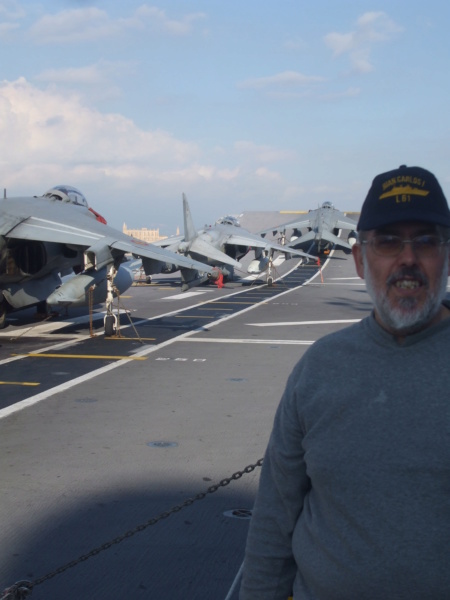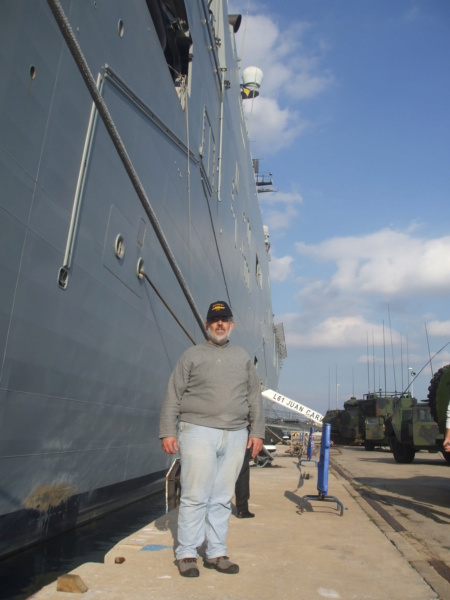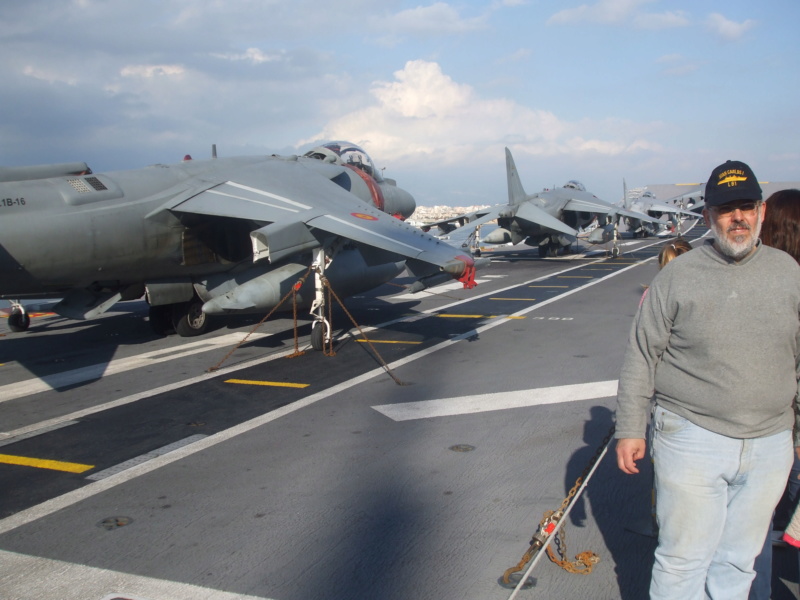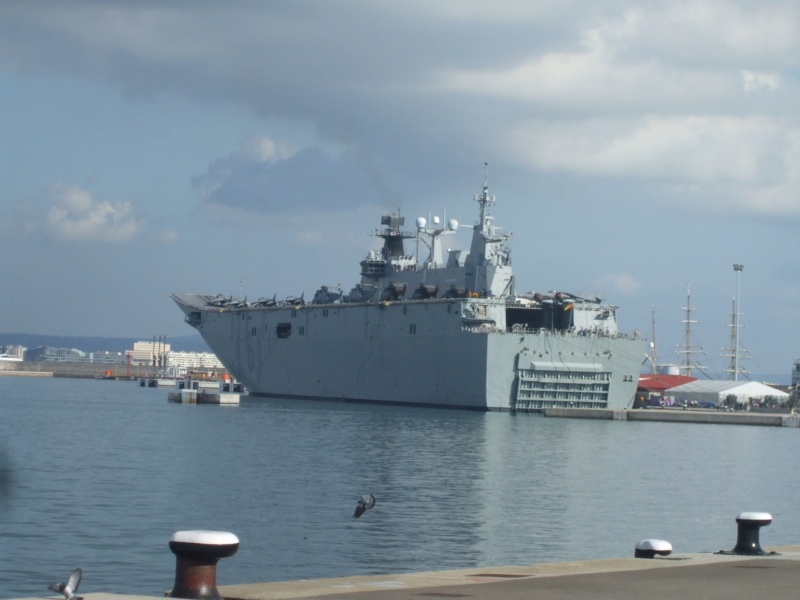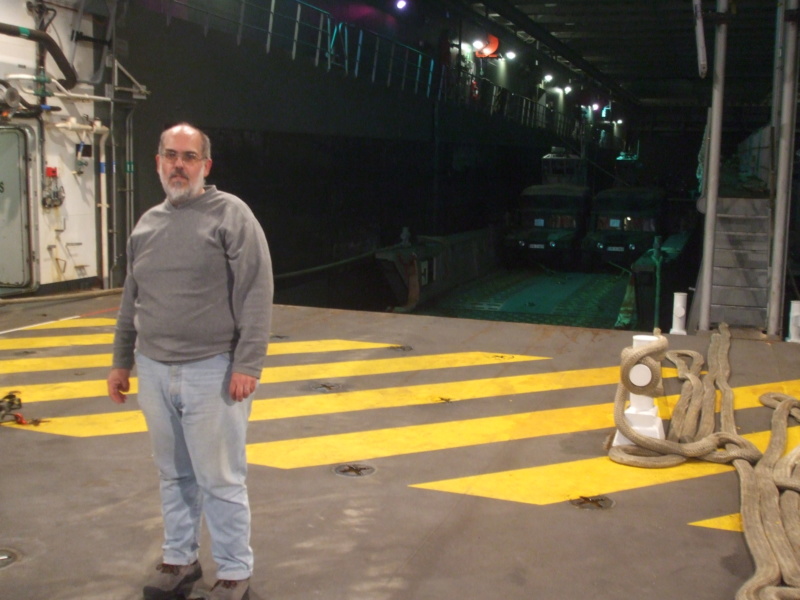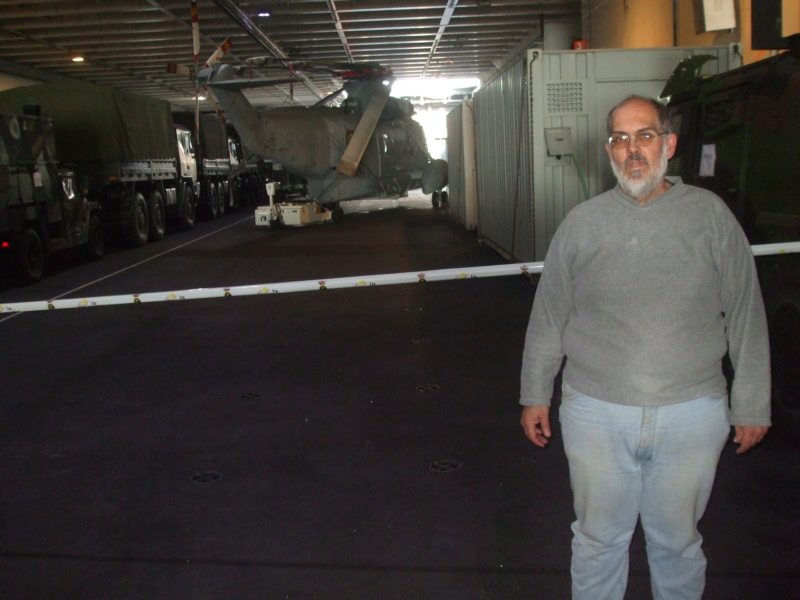España
+25
daniel alejandro
vudu 1
siberianwolf
marco aurelio l
Nilo
Aristócrata
CHACAL
jc65
gdiaz62
Gerardo
elmiliciano
flint
Anti-imperialista
nick7777
delta074
Caribe
Tiuna
Tato
horz
Arpia
Cevarez
-Clark-
HUNTER VZLA
Blas de Lezo
jeepero911
29 participantes
El Foro Militar de Venezuela :: Fuerzas Armadas del Resto del mundo :: Fuerzas Armadas de Norteamerica y Europa
Página 17 de 17.
Página 17 de 17. •  1 ... 10 ... 15, 16, 17
1 ... 10 ... 15, 16, 17

Nilo- Sargento Ayudante
- Cantidad de envíos : 8564
Fecha de inscripción : 03/04/2010
Localización : sparrow 7h
 Re: España
Re: España
Machuca marcando la pauta

flint- Primer Teniente
- Cantidad de envíos : 11163
Fecha de inscripción : 10/03/2011
Localización : Carabobo
 Re: España
Re: España
NAVANTIA evoluciona y mueve fichas
https://www.edrmagazine.eu/smart-4000-navantia-looks-at-the-future
SMART 4000: Navantia looks at the future
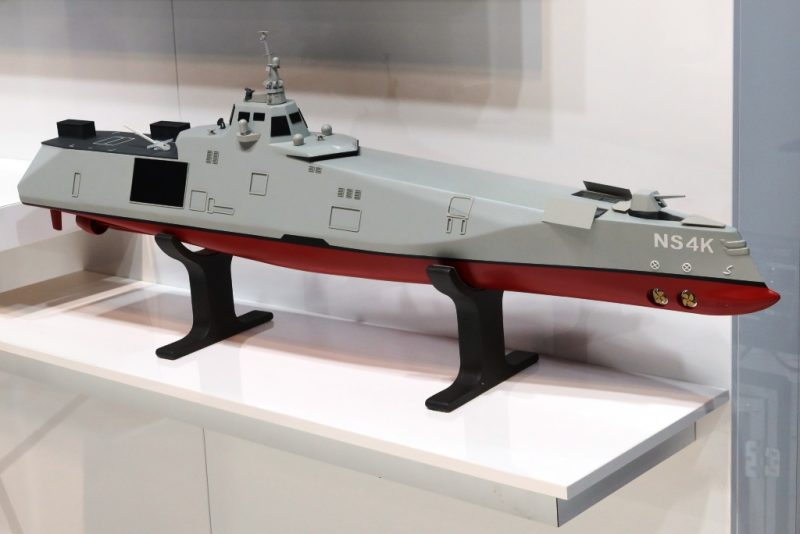
A double innovation was visible in the Navantia stand at FEINDEF, in the form of a model of what might be defined as a “concept ship” paraphrasing the “concept car” definition used in the automotive world. Twice innovative, because the model itself was produced using a 3D printer, the Spanish shipyard aiming at developing that technology in order to allow ships to produce spares on board when needed, reducing the logistic footprint.
04/11/2021 concept ship, FEINDEF, Navantia, SMART 4000, VLJ, Voith
By Paolo Valpolini
Back to the model of what is known as SMART 4000, the number being the approximate displacement of what is the first of a series of designs that will range from smaller platforms of around 2,000-2,500 tonnes, up to 8,000-10,000 tonnes vessels.
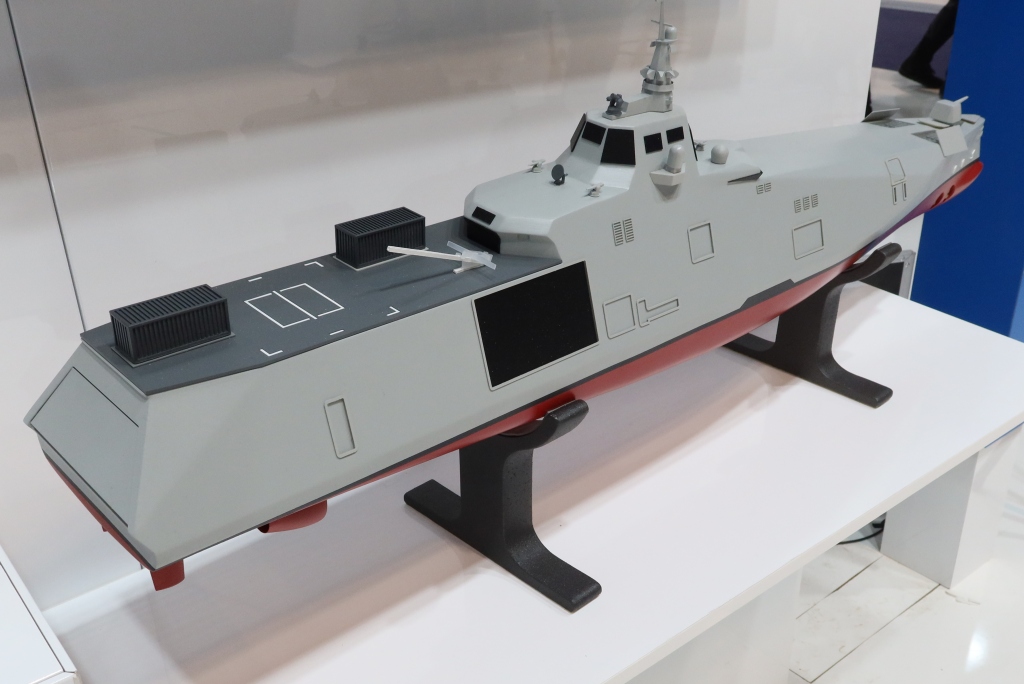
click on image to enlarge
“This is our vision of what might be a future surface combatant vessel in 10-15 years time,” Juan Antonio Clemente Fernández tells EDR On-Line; he is part of the Engineering Digital Transformation, Ship Concept Design Office within the Digital Transformation and Technology Directorate. “This model is that of an escort vessel that will be fitted with a hybrid diesel-electric propulsion, although we are also looking at different kind of propulsion, that will have a maximum speed of around 25 knots,” he adds. The model shows the adoption of Voith Linear Jets (VLJ); this solution has a number of advantages according to its manufacturer, among which the limited number of moving parts, which makes the system robust and easy to maintain, while the nozzle and rotor profile, which are specially adapted to the ship, generate extremely low noise and vibration emissions, Mr. Clememte adding that they are also suited for electric propulsion. Alternatively pod propulsion might be adopted, should manoeuvrability become a priority, the current design being fitted anyway a double bow thruster. All electric propulsion is being considered for different types of mission profiles, mostly those at low speed, while to reach full speed hybrid propulsion will be used.
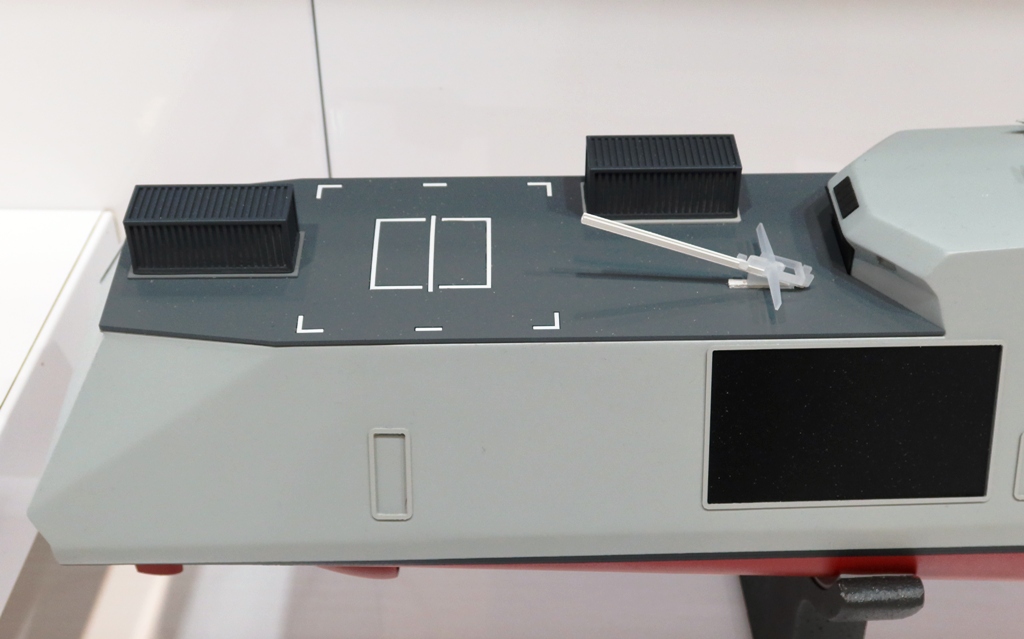
click on image to enlarge
Key design parameters were stealthness, which as far as radar cross section is concerned is ensured by the shape of the unit, and the capacity to deploy unmanned systems operating in the air, on the surface and underwater, which will extend the reach of the ship itself in terms of sensors and effectors. “All the rear of the ship is dedicated to this multi-mission role,” Mr. Clemente explains. What should be a flight deck is occupied by two containers, one possibly containing UAVs while the second might host additional missile launchers, a ramp for a tactical UAV being also visible. A huge hatch on the starboard side will allow to launch Unmanned Surface Vehicles, while according to Mr. Clemente a further opening, located under the waterline, will be used to deploy unmanned underwater vehicles.
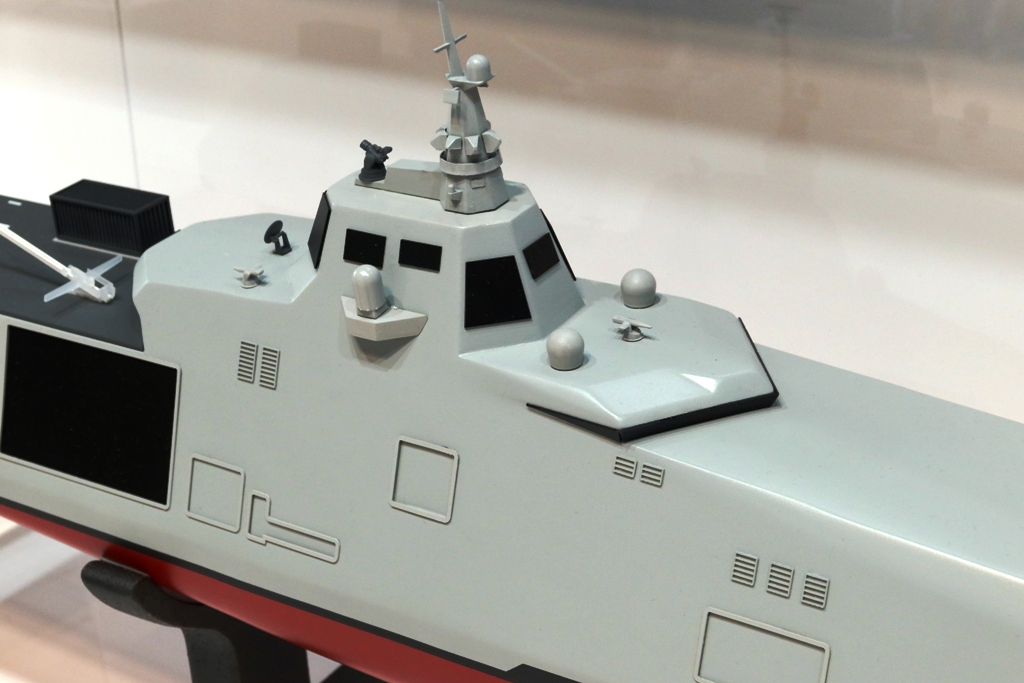
click on image to enlarge
The centre of the ship hosts the operational heart of the vessel, the combat information centre and other operational rooms being in and under the superstructure, Navantia aiming at integrating information as much as possible. Currently the estimated complement of the SMART 4000 is of around 70 people; “however we are studying where functions can be replaced by autonomous systems working under human supervision, which can be developed thanks to the most recent technologies, and this should allow us to further reduce the number of people on board”, the Navantia representative says.
The superstructure is fitted with flat panel AESA antennas, the aim being to have only a few non flat-panel antennas on board, among them some for electronic warfare systems installed on the ship mast.
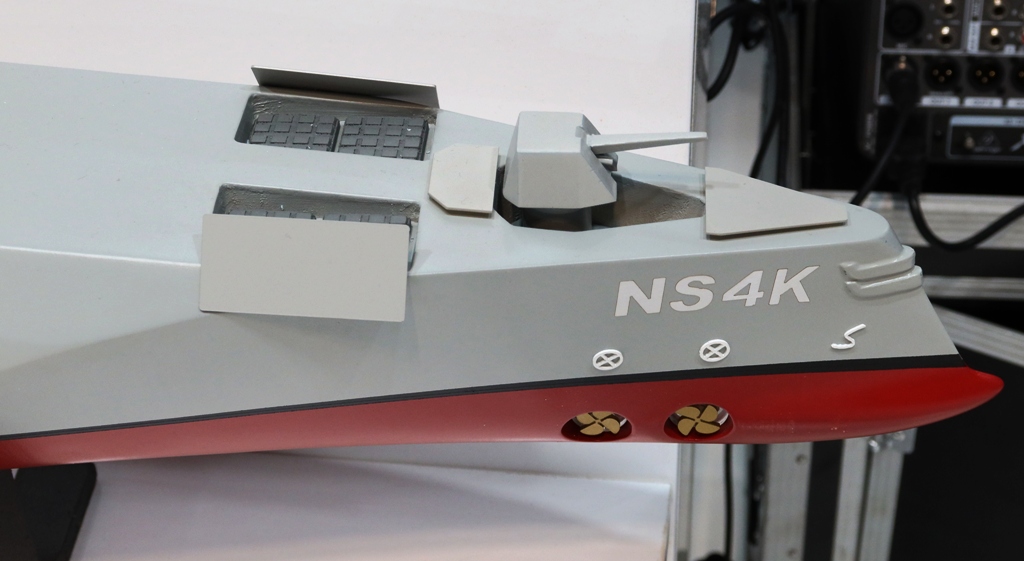
click on image to enlarge
Moving towards the bow, the section ahead of the superstructure host the berthing and living areas, the ship weaponry being located forward of the crew accommodations. A 76 mm gun is located at the extremity of the ship which length is around 120 meters, while just before it we find four 16-cell vertical launch systems, “however we should not forget that those are complemented by the effectors carried by unmanned systems,” Mr. Clemente underlines.
The hull shape was designed by Navantia hydrodynamic engineers with speed as a priority, and features a wave-piercing bow. “We will certainly build a ship that will be used as a technology demonstrator,” Juan Antonio Clemente concludes, “however there is not yet a fixed timeline for this, although we might assume that it should become reality in a 5-10 years timeframe.”
https://www.edrmagazine.eu/smart-4000-navantia-looks-at-the-future
SMART 4000: Navantia looks at the future

A double innovation was visible in the Navantia stand at FEINDEF, in the form of a model of what might be defined as a “concept ship” paraphrasing the “concept car” definition used in the automotive world. Twice innovative, because the model itself was produced using a 3D printer, the Spanish shipyard aiming at developing that technology in order to allow ships to produce spares on board when needed, reducing the logistic footprint.
04/11/2021 concept ship, FEINDEF, Navantia, SMART 4000, VLJ, Voith
By Paolo Valpolini
Back to the model of what is known as SMART 4000, the number being the approximate displacement of what is the first of a series of designs that will range from smaller platforms of around 2,000-2,500 tonnes, up to 8,000-10,000 tonnes vessels.

click on image to enlarge
“This is our vision of what might be a future surface combatant vessel in 10-15 years time,” Juan Antonio Clemente Fernández tells EDR On-Line; he is part of the Engineering Digital Transformation, Ship Concept Design Office within the Digital Transformation and Technology Directorate. “This model is that of an escort vessel that will be fitted with a hybrid diesel-electric propulsion, although we are also looking at different kind of propulsion, that will have a maximum speed of around 25 knots,” he adds. The model shows the adoption of Voith Linear Jets (VLJ); this solution has a number of advantages according to its manufacturer, among which the limited number of moving parts, which makes the system robust and easy to maintain, while the nozzle and rotor profile, which are specially adapted to the ship, generate extremely low noise and vibration emissions, Mr. Clememte adding that they are also suited for electric propulsion. Alternatively pod propulsion might be adopted, should manoeuvrability become a priority, the current design being fitted anyway a double bow thruster. All electric propulsion is being considered for different types of mission profiles, mostly those at low speed, while to reach full speed hybrid propulsion will be used.

click on image to enlarge
Key design parameters were stealthness, which as far as radar cross section is concerned is ensured by the shape of the unit, and the capacity to deploy unmanned systems operating in the air, on the surface and underwater, which will extend the reach of the ship itself in terms of sensors and effectors. “All the rear of the ship is dedicated to this multi-mission role,” Mr. Clemente explains. What should be a flight deck is occupied by two containers, one possibly containing UAVs while the second might host additional missile launchers, a ramp for a tactical UAV being also visible. A huge hatch on the starboard side will allow to launch Unmanned Surface Vehicles, while according to Mr. Clemente a further opening, located under the waterline, will be used to deploy unmanned underwater vehicles.

click on image to enlarge
The centre of the ship hosts the operational heart of the vessel, the combat information centre and other operational rooms being in and under the superstructure, Navantia aiming at integrating information as much as possible. Currently the estimated complement of the SMART 4000 is of around 70 people; “however we are studying where functions can be replaced by autonomous systems working under human supervision, which can be developed thanks to the most recent technologies, and this should allow us to further reduce the number of people on board”, the Navantia representative says.
The superstructure is fitted with flat panel AESA antennas, the aim being to have only a few non flat-panel antennas on board, among them some for electronic warfare systems installed on the ship mast.

click on image to enlarge
Moving towards the bow, the section ahead of the superstructure host the berthing and living areas, the ship weaponry being located forward of the crew accommodations. A 76 mm gun is located at the extremity of the ship which length is around 120 meters, while just before it we find four 16-cell vertical launch systems, “however we should not forget that those are complemented by the effectors carried by unmanned systems,” Mr. Clemente underlines.
The hull shape was designed by Navantia hydrodynamic engineers with speed as a priority, and features a wave-piercing bow. “We will certainly build a ship that will be used as a technology demonstrator,” Juan Antonio Clemente concludes, “however there is not yet a fixed timeline for this, although we might assume that it should become reality in a 5-10 years timeframe.”

Nilo- Sargento Ayudante
- Cantidad de envíos : 8564
Fecha de inscripción : 03/04/2010
Localización : sparrow 7h
 Re: España
Re: España
No es un proa de hacha ?

flint- Primer Teniente
- Cantidad de envíos : 11163
Fecha de inscripción : 10/03/2011
Localización : Carabobo
 Re: España
Re: España
SIP... algo modificada... pero AXLE BOW
como el ZUMWALT
como el ZUMWALT
flint escribió:No es un proa de hacha ?

Nilo- Sargento Ayudante
- Cantidad de envíos : 8564
Fecha de inscripción : 03/04/2010
Localización : sparrow 7h
 Re: España
Re: España
Esta muy interesante el concepto, todo integrado todo under deck y propulsion electrica
_________________________________________________
"Basta de tanta habladera de paja!, FUERZA NACIONAL al poder"
ATENCION No soy oficial de la FANB, ni enlace, ni esta es una pagina oficial de la FANB. Tampoco soy gestor para tramites de la FANB toda la informacion es publica y esta en el foro
 Re: España
Re: España
Nilo escribió:SIP... algo modificada... pero AXLE BOW
como el ZUMWALTflint escribió:No es un proa de hacha ?
Nilo y usted no es detractor de esa configuración ?

flint- Primer Teniente
- Cantidad de envíos : 11163
Fecha de inscripción : 10/03/2011
Localización : Carabobo
 Re: España
Re: España
si... pero para gustos... colores...
no obstante hay una importante y gran diferencia entre las proas de hacha de los ZUMWALT e incluso esta y la de los buques DAMEN
y se trata del gran lanzamiento (longitud) de la proa seguida luego de un "engrosamiento" de la manga... una configuracion bastante diferente de la de los barcos DAMEN y con otra respuesta muy diferente...
si veo en el modelo español que el armamento esta muy a la proa... aunque ya se aprecia que los silos de los misiles tienen una cubierta
no obstante hay una importante y gran diferencia entre las proas de hacha de los ZUMWALT e incluso esta y la de los buques DAMEN
y se trata del gran lanzamiento (longitud) de la proa seguida luego de un "engrosamiento" de la manga... una configuracion bastante diferente de la de los barcos DAMEN y con otra respuesta muy diferente...
si veo en el modelo español que el armamento esta muy a la proa... aunque ya se aprecia que los silos de los misiles tienen una cubierta
flint escribió:Nilo escribió:SIP... algo modificada... pero AXLE BOW
como el ZUMWALTflint escribió:No es un proa de hacha ?
Nilo y usted no es detractor de esa configuración ?

Nilo- Sargento Ayudante
- Cantidad de envíos : 8564
Fecha de inscripción : 03/04/2010
Localización : sparrow 7h
 Re: España
Re: España
este me recuerda cuando invitaron a los integrantes de la mision naval venezolana a comer a bordo del BAM METEORO tras las pruebas de mar del barco...
la comida servida era tan buena que los "misioneros" preguntaron que "de donde habia venido el catering" para poder ellos comprarlo cuando viniera "Visita"... y la respuesta de los españoles fue que la comida era de a bordo, hecja por los cocineros del barco y que era parte del "rancho normal" del barco
y es que los cocineros de la armada española hacen cursos especificos de cococina e incluso talleres de formacion con "chef's" de renombre... recuerdo tambien que los integrantes de la cocina del GUAIQUERI...pasaron una semana en la cocina del restaurante del astillero "aprendiendo" a cocinar... pero sobre todo a utilizar las maquinas y equipos de cocina
la comida servida era tan buena que los "misioneros" preguntaron que "de donde habia venido el catering" para poder ellos comprarlo cuando viniera "Visita"... y la respuesta de los españoles fue que la comida era de a bordo, hecja por los cocineros del barco y que era parte del "rancho normal" del barco
y es que los cocineros de la armada española hacen cursos especificos de cococina e incluso talleres de formacion con "chef's" de renombre... recuerdo tambien que los integrantes de la cocina del GUAIQUERI...pasaron una semana en la cocina del restaurante del astillero "aprendiendo" a cocinar... pero sobre todo a utilizar las maquinas y equipos de cocina
TAVOR escribió:
Última edición por Nilo el Sáb 11 Jun - 15:15, editado 1 vez

Nilo- Sargento Ayudante
- Cantidad de envíos : 8564
Fecha de inscripción : 03/04/2010
Localización : sparrow 7h
 Re: España
Re: España
Nilo escribió:este me recuerda cuando invitaron a los integrantes de la mision naval venezolana a comer a bordo del BAM METEORO tras las pruebas de mar del barco...
la comida servida era tan buena que los "misioneros" preguntaron que "de donde habia venido el catering" para poder ellos comprarlo cuando viniera "Visita"... y la respuesta de los españoles fue que la comida era de a bordo, hecja por los cocineros del barco y que era parte del "rancho normal" del barco
y es que los cocineros de la armada española hacen cursos especificos de cococina e incluso talleres de formacion con "chet's" de renombre... recuerdo tambien que los integrantes de la cocina del GUAIQUERI...pasaron una semana en la cocina del restaurante del astillero "aprendiendo" a cocinar... pero sobre todo a utilizar las maquinas y equipos de cocinaTAVOR escribió:
Igual que les mandaron a quitar el agua caliente a los bvl y povzee por qué eso en la armada no es aceptable

flint- Primer Teniente
- Cantidad de envíos : 11163
Fecha de inscripción : 10/03/2011
Localización : Carabobo
Página 17 de 17. •  1 ... 10 ... 15, 16, 17
1 ... 10 ... 15, 16, 17
El Foro Militar de Venezuela :: Fuerzas Armadas del Resto del mundo :: Fuerzas Armadas de Norteamerica y Europa
Página 17 de 17.
Permisos de este foro:
No puedes responder a temas en este foro.





